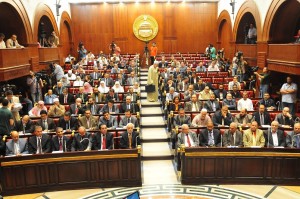TEHRAN: A Sunni group in Iran has claimed it kidnapped a man working at a nuclear facility and has threatened to spill his secrets if members of the group held by Tehran are not released.
Jundallah (Soldiers of God) said on its website junbish.blogspot.com late on Saturday that it was holding hostage Amir Hossein Shirani, an "employee at a nuclear plant" in Iran’s central province of Isfahan.
"Mr Shirani has important information, especially about senior Iranian nuclear experts… and release of his confessions will cost the Iranian regime dearly," it said in a statement, without adding when Shirani was abducted.
Jundallah has demanded that Tehran free what it said were more than 200 Sunni and Baluch political prisoners and members of the group held in Iranian jails, the statement added.
It warned that failure to do so "within a week" would lead to "releasing to the public the information gathered from Mr Amir Hossein Shirani, so the world finds out more about the Iranian regime’s secret nuclear activities."
The website said Shirani was being held in the mountains of the southeastern Sistan-Baluchestan province bordering Pakistan and Afghanistan, an area known for drug smuggling and tribal unrest.
Iranian officials confirmed the kidnapping but downplayed it.
"Amir Hossein Shirani worked as a welder for a short period and then as a driver for one of the companies contracted with" the Iran Atomic Energy Organization, said Hamid Khadem Qaemi, a spokesman for the nuclear body.
"He is not employed with Iran’s Atomic Energy Organization" any more, Qaemi was quoted as saying by Farhang-e Ashti newspaper on Sunday, adding that the abduction was a "personal matter and not linked to the nuclear issue."
Gholam Reza Ansari, the judiciary chief in Isfahan, also confirmed that Shirani had been kidnapped, but said the "abduction was related to a financial dispute with a drug cartel in Sistan-Baluchestan."
Jundallah’s claim comes after Iran admitted on Friday that Western nations have been spying on its controversial nuclear program, but that Tehran had managed to halt it.
The West led by Washington suspects that Iran is seeking to make atomic weapons under the guise of a civilian nuclear program, a charge Tehran denies.
Jundallah says it is fighting for the interests of Sistan-Baluchestan’s large ethnic Baluch community who, unlike most Iranians who are Shia, mainly follow the Sunni branch of Islam.
In the past decade, Jundallah has admitted responsibility for many deadly attacks on Iranian security forces as well as assaults that have led to civilian deaths in Sistan-Baluchestan.
In July, it launched twin suicide bombings at a mosque in the provincial capital Zahedan, reportedly targeting members of Iran’s elite Revolutionary Guards Corps, killing 28 people.
The authorities have cracked down hard on the group, arresting many suspected members and executing its leader Abdolmalek Rigi in June.



